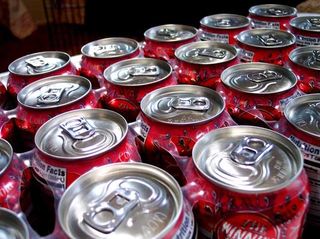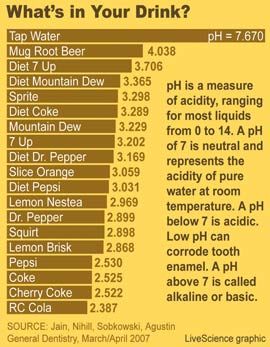Acids in Popular Sodas Erode Tooth Enamel

Root beer could be the safest soft drink for your teeth, new research suggests, but many other popular diet and sugared sodas are nearly as corrosive to dental enamel as battery acid.
Prolonged exposure to soft drinks can lead to significant enamel loss, even though many people consider soft drinks to be harmless or just worry about their sugar content and the potential for putting on pounds, the study says.
The erosive potential of colas is 10 times that of fruit juices in just the first three minutes of drinking, a study last year showed. The latest research, published in Academy of General Dentistry (AGD) journal General Dentistry, reports that drinking any type of soft drink hurts teeth due to the citric acid and/or phosphoric acid in the beverages.

"This study simply doesn’t mirror reality," said American Beverage Association spokesperson Tracey Halliday. "The findings cannot be applied to real life situations where people's eating and drinking behaviors are very different and there are many factors at work."
- Nutrition Quiz
5 percent weight loss
The study measured the acidity, or pH, of 20 commercial soft drinks, including Coke, Pepsi, 7 Up and their diet versions, immediately after cans were opened. Then slices of enamel from freshly extracted teeth were weighed before and after being immersed in the soft drinks for 48 hours.
The result was that the teeth immersed in Coke, Pepsi, RC Cola, Squirt, Surge, 7 Up and Diet 7 Up lost more than 5 percent of their weight, according to the report by Poonam Jain of the Southern Illinois University School of Dental Medicine and her colleagues. (Other sodas brought about losses in the enamel weight in the range of 1.6 percent to 5 percent).
Sign up for the Live Science daily newsletter now
Get the world’s most fascinating discoveries delivered straight to your inbox.
AGD spokesman Kenton Ross said that RC Cola was found to be the most acidic soft drink studied, with a pH of 2.387 (the pH scale ranges from 0 to 14 for most liquids, with 0 being the most acidic and 14 being the least acidic—or most alkaline). Cherry Coke was found to be the next most acidic (pH of 2.522), and Coke was the third most acidic soda tested (pH of 2.525).
Battery acid has a pH of 1.0. Pure water at room temperature has a pH of 7.0.
The results show that a soda's acidity is not the whole story when it comes to tooth erosion. The type of acid in the soda, level of soda and calcium content are also factors. Citric acid is the most erosive acid found in soft drinks and is the predominant acid in non-cola drinks.
"The bottom line is that the acidity in all soft drinks is enough to damage your teeth and should be avoided," Ross said in a prepared statement.
Root beer's advantage
Root beer was found to be the least acidic of all soft drinks, with a pH 4.038 for the Mug brand, Jain and her colleagues found. The reason for the reduced acidity is that root beer is often non-carbonated and contains no phosphoric or citric acids.
A 2006 study reported that orange juice and sports drinks also reduce the surface hardness of tooth enamel, but a cola reduced more—the dentin, surface enamel and two additional dental components. (Dental erosion refers to the action of acid on the entire tooth surface. Cavities and tooth decay tend to hit targeted areas, such as pits, grooves and spots where teeth are adjacent).
In the past 40 years, many Americans have swapped nutrient-dense milk for sodas and other beverages that are mostly bereft of nutrients. In 1966, Americans drank, on average, 20 gallons of soft drinks and 33 gallons of milk. In 2003, Americans drank an average of 46 gallons of soft drinks and 22 gallons of milk. Milk contains minerals, proteins, vitamins and, most importantly, calcium.
Study shortcomings
No one swishes soda in their mouth for two full days, as was the case with the study, but the corrosive effect of soda starts nearly immediately, Jain's research points out, and increases with time.
Richard Adamson, a scientific consultant to the American Beverage Association, called the study "unrealistic," pointing out, among other things, that toothbrushing was not factored in.
"The most protective factor you have in your mouth is saliva, which has both a diluting and a buffering effect," Adamson told LiveScience. "Of course, you're not going to mirror reality (with the new study)."
"There are many foods which are as important as soft drinks in oral health and dental hygiene," Adamson said. "Fruit and fruit juices and cider and food such as pickles and salad dressing and wine—those are just as important in regards to general erosion as soft drinks. There is no single food or beverage that is responsible for dental erosion. There are numerous factors. The thing is to enjoy everything in moderation."
Ross recommends that consumers drink soda through a straw, if at all, as that reduces the teeth's exposure to the beverage. One way to reduce soda intake, he suggested, is to drink it only with meals.
- Bad Habits: Why We Can't Stop
- Top 10 Bad Things That Are Good For You
- Cola Raises Women's Osteoporosis Risk
- Soda Sales Go Flat, Industry Fights Back
- Soda-Cancer Link Revealed As Myth
Robin Lloyd was a senior editor at Space.com and Live Science from 2007 to 2009. She holds a B.A. degree in sociology from Smith College and a Ph.D. and M.A. degree in sociology from the University of California at Santa Barbara. She is currently a freelance science writer based in New York City and a contributing editor at Scientific American, as well as an adjunct professor at New York University's Science, Health and Environmental Reporting Program.
Most Popular


